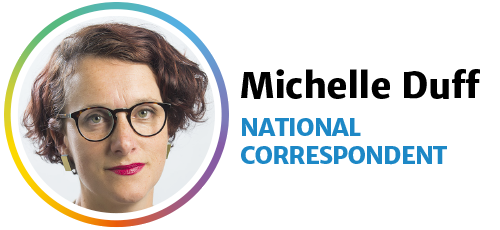

On February 28, 2018, as part of the global Me Too movement, Stuff and Alison Mau asked people to come forward with their stories of workplace sexual harassment and assault. The response was overwhelming. Hundreds of women - and some men - contacted us.
We knew this work was going to be challenging. We didn’t understand just how much.
Some of those who got in touch had been carrying the hurt for decades, and never before told a soul. Though they knew we were journalists, and our team was set up to investigate sexual misconduct, some did not want their story published; they simply wanted someone to hear them.
As a hospitality worker in bars and coffee shops, Erin told us she’d been battling sexual misconduct for her entire working life.
“We hope you aren’t going to ogle, stare, touch or make inappropriate and even aggressive comments, but when this happens, which is frequently, we are told to get on with the job and ‘get over it’.
“I get angry when I think about the insulting comments made when I asked for help. Maybe with the use of media and storytelling, we can start a nationwide movement dedicated to changing this unacceptable status quo.”
Ruby* told us she was raped by her boss, and her reasons for not coming forward have been echoed by many others.
To have my moral fibre tested, questioned and challenged, and for what? For everyone to call me that lying slut, family wrecker, life ruiner?
They worried about being passed over for promotion, or losing their jobs. They felt it might impact on their careers or future employment. Our team was told of employment “blacklists” that circulated in their industry or town, naming the “trouble makers” and making it difficult to find another job. Some women contacted us and wanted to talk, but changed their minds because the memories were too painful.
Most strikingly - and directly contradicting those who had branded #metooNZ a “witchhunt” - many were so concerned for their harasser’s family and reputation that they refused to report concerning behaviour. For some women, the idea of their perpetrator knowing they had told anyone was terrifying enough.
The experiences sent to #metooNZ repeatedly proved how normalised sexual harassment has become in New Zealand workplaces. Some women told us it had been a regular feature of their entire working lives - and looking back, they’re angry. An actor voices Erin’s story.
The experiences sent to #metooNZ repeatedly proved how normalised sexual harassment has become in New Zealand workplaces. Some women told us it had been a regular feature of their entire working lives - and looking back, they’re angry. An actor voices Erin’s story.
Rape myths and self-blame
Rape myths, and societal attitudes toward sex and sexual assault, loomed large in the stories we heard. Many victims blamed themselves for the harassment, wondering if they had flirted too much, dressed too nicely or been “too friendly.” Others blamed themselves for not reporting, and worried for years that their harasser was still out there.
But the power of the Me Too movement is in the strength of the collective. Many of the women who contacted us thanked us for the opportunity to be listened to, and said they felt less alone. Although their individual stories would not be published, we wanted to honour these women, too.
In order to do this, we undertook a detailed qualitative analysis of the hundreds of emails, messages, and phone calls received since the beginning of this project.
We found evidence to suggest sexual harassment is endemic in a wide range of industries in New Zealand, in companies of every size. We identified recurring themes in these stories, shared experiences that happened over and over again.
In this project, we have used actors to bring the voices of five of these women to life.
From all walks of life
People worked in industries from hospitality to advertising, architecture to food processing. Many worked in white-collar professions, like law or IT, while others worked on the factory floor, or as bartenders and kitchen hands. Some women detailed experiences of workplace sexual misconduct throughout their lives, beginning in their first job as teenagers and continuing throughout their professional careers.
While we called for people to share their experiences of sexual harassment and assault in the workplace, many came forward with abuse in other relationships where there was a steep power imbalance.
Some of them did not report the misconduct. Others did what society tells them is the right thing, and tried to address the misconduct through HR, or reported it to police and pursued justice for years through the legal system.
Many found the processes that were meant to be there to protect them more traumatising than the original behaviour. Public servant Emily’s superior sent her sexually explicit emails, requested inappropriate pictures and touched her without consent, but she found the aftermath - the process of raising a formal complaint - even worse.
“What followed was one of the most traumatising experiences I have ever had to go through,” she says. “I thought I was doing the right thing at the time.” She is not sure she would do it again.
In this series, Stuff explores four major themes we identified as pervasive in women’s experiences of sexual harassment. These are: women blaming themselves for what has happened to them and how they dealt with it; a sense of powerlessness and how hard it is to report; being re-victimised by the process of making a complaint; and the long-term impacts on their lives and careers.
Workplace sexual misconduct is a huge issue in New Zealand. Reading through these stories has been harrowing. Speaking to women whose lives have been immeasurably damaged by their experience in a place that should have been safe is heartbreaking.
The #metooNZ impact
But our work has had an impact. We exposed the size of the problem, using the Official Information Act to lodge a widespread survey to reveal rising rates of sexual harassment complaints in 1400 public sector bodies, from schools to government departments. This uncovered stories of harassment in the state sector, exposed systemic failures and garnered guarantees from the Film Commission, Ministry of Social Development and the New Zealand Defence Force to improve processes.
When we revealed Mariya Taylor, a victim of sexual harassment in the Air Force, was being pursued for almost $150,000 in costs, the Prime Minister directed the Defence Force to drop its claim. Readers donated $52,000 for Taylor’s legal fees.
A seaborne charity mission was scrapped after we revealed volunteers were preyed on by the charity’s creator. Charities Services launched its own investigation in response.
Our reporting on Dr Deane Drew prompted the Medical Council to revise guidelines on doctor/patient relationships, and the way its investigative committee operates. He is now facing charges in the Health Practitioners Disciplinary Tribunal.
Stuff readers donated $55,000 to pay Rachel MacGregor’s legal fees after our coverage, and former Conservative Party leader Colin Craig dropped his claim for costs against her.
Victoria University started formal faculty discussions on a new harassment policy after we revealed the sexual harassment of students by a tutor.
Our court battle to reveal a super injunction taken by the Law Society to conceal a new case of alleged sexual harassment or bullying by a senior lawyer, prompted the Justice Minister to demand an explanation from the Law Society.
And the stories keep coming in.
* Name changed.
WANT TO SEEK HELP? Access advice on how to contact police or other support services.

Journalists: Alison Mau, Michelle Duff and Cecile Meier
Video Producer/Director: Jo Raj
Videographer: Phil Johnson
Designer/Developer: Kathryn George
Editor: John Hartevelt





